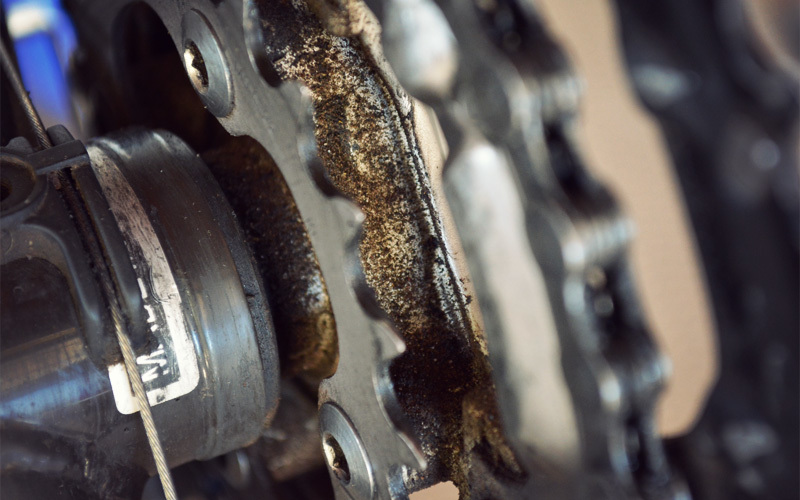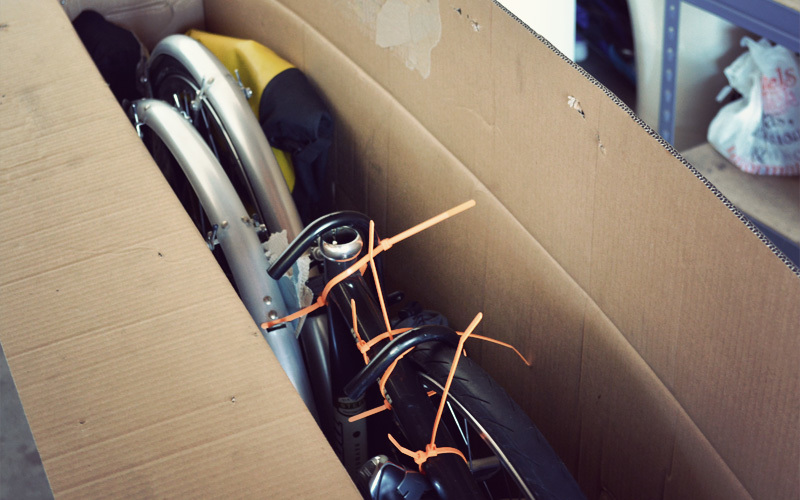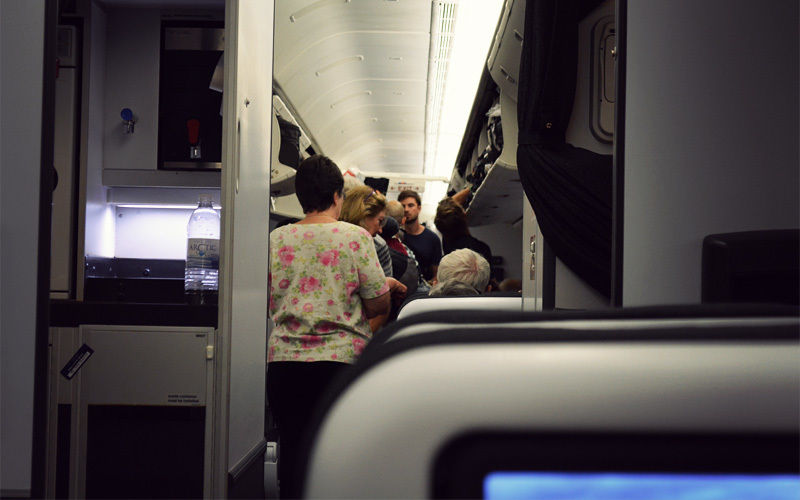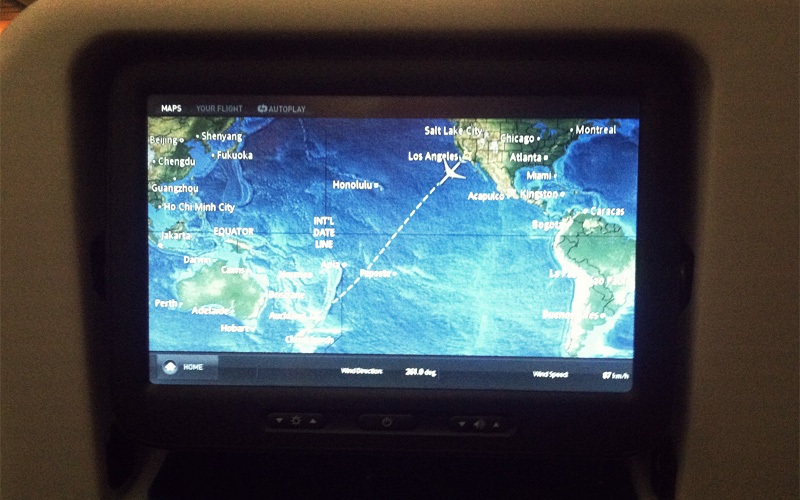September 27, 2014
Days 40-41: Rancho Palos Verdes, CA to 35,000 feet above the Pacific Ocean
Sunday October 5, 2014 & Monday October 6, 2014
We wake up around 7:00 and soon after eat pecan pancakes and bacon with Kristen's mom and stepdad outside, next to the pool, beneath the shade of a large umbrella. The morning is warm, windless, cloudless, and the smell of the coast fills the air, all of which describes what every morning here feels like. It's beautiful and above complaint. Around the table the four of us talk about puppies and music trivia and mobile phone plans. Kristen and I feel calm, rested, not rushed, and certain of what we're doing — and we know it's the last time we'll feel that way for the next thirty-plus hours.

| Heart | 1 | Comment | 0 | Link |
Although earlier in the week we started the process of cleaning our bikes to the extreme degree that's required to pass through customs in New Zealand, we never finished. And when we last looked at the bikes it was at night, under the dim glow of the single light that hangs down from the ceiling of the garage. In the brightness of the morning, with the kind of clarity and attention to detail that come only with the knowledge that we have to start packing the van to leave for the airport in eight hours, one look at the bicycles shows that we severely underestimated the amount of work set out in front of us.
Instead of twenty minutes like I expected, we spend more than two hours armed with rags and toothbrushes, cleaning in between tire treads, degreasing chains and chain rings and cassettes, and washing away the bits of dirt that accumulate in places you never much notice when you're on the road, like around the springs of the brake arms, the cable guides that run below the bottom bracket, and the thirty-five cutouts and corners required to let all of the parts of the rear derailleur fit together. By the time it's done my hands are more black than off-white, my legs are again spotted with dirt and grease, and every time I look in the mirror I find on a different part of my face a streak of something dirty that's almost impossible to wipe off. Because it's so new and still relatively clean, Kristen's bike will pass inspection without a problem. Mine on the other hand, with some components that haven't been taken off and cleaned at any point in the last six years and almost 20,000 miles of riding, might get us deported for all of the dirt, despite the furious scrubbing.
Next we get to put together the boxes that will transport our bikes and everything else that won't fit in one large and one small pannier. One advantage to staying so close to beach towns is that the bicycle shops all sell mostly cruiser bikes, which means that the boxes we picked up are a little bigger than normal. But bigger, as we soon find out, still isn't very big. That means the next hour involves unbolting handlebars and racks and seat posts, and then twisting and turning and shoving them into the box in half a dozen configurations until we find the one that we think will result in the fewest broken spokes, scratched paint, and impossibly bent rear derailleurs. Then it's a matter of shoving bubble wrap and packing paper into every tight space, and zip-tying into place anything else that looks like it might even think about moving more than a fraction of an inch. Throughout the process I wonder how much of the work is just an exercise. It seems like no matter how well we pack our bikes, if some airport ramp worker decides to run over them with one of those stubby little airport trucks or turn the boxes upside down and stack thirty suitcases or a pallet of yoga pants on top of them, we're going to arrive in Auckland with bikes in far worse shape than when last we saw them.
The sleeping bag, the tent, and a dozen other bits of gear that together weight in at almost fifty pounds get crammed into a third box that bends out at its sides and requires an intricate dance of squeezing and grunting and aggressive taping to close. It looks like it could explode and send sleeping pads and panniers shooting into all corners of the garage at any moment.
An hour before we head off to dinner we realize that there's no more packing to do, no more documentation to print out, and no more showers to take. We've done all that we can and all that's needed. But what we feel isn't relief or excitement but fatigue that hits us like some kind of heavy weight now that the surge of adrenaline that's been our companion for the last week has faded away. Soon our stomachs decide to get weird and make it seem like we're moments from puking. For the first time, the reality of what we're about to do, the amount of time we'll be gone, and what it will feel like to be apart from friends and family for so long descends on us in this strange mix of anxiety, sadness, and wonder. Even though we rode for a month to reach California, at no point were we more than a long car ride from home or a familiar face. It would have taken only a phone call or a text message to unwind everything. And even though we have no desire to unwind any part of this trip, this world tour — which we've talked about and dreamed about every day since late April — is only a few hours away from heading in a new direction, and nothing in our collected experiences has prepared us for what's coming our way.
It's wonderful, all of it. we didn't leave behind our lives in Portland because we wanted something familiar. We wanted to feel unsure, to say goodbye to the predictable and what we already understand. That's the kind of environment where we can thrive, where we can grow, and where we can find out what new things we might be capable of achieving. Everyone should be so fortunate.
Everyone should also be so fortunate when it comes to understanding the visa requirements of the countries they're traveling to, but we are not. Because we're American citizens, New Zealand doesn't require us to arrange a visa ahead of time. But because we're traveling on to Australia and not back to the U.S., it turns out we also need to have our Australian visa before we board the plane to Auckland. This is something we thought nothing about until the moment the airline agent mentions it. What follows is about five seconds of wider eyes and probably some kind of weird facial expressions as we consider the fact that this might mean all of the suspense and anxiety and build-up were for nothing, that we'll have to go back to Palos Verdes, and that we'll have to spend who knows how many hundreds of dollars to reschedule our flight.
But then the agent, in a calm voice just above the level of audible, tells us that we can buy the visa there at the counter for twenty-five dollars, which leads to great relief all around and the unclenching of my butthole.
We stand around among a bunch of people at the security checkpoint, then stand around among a bunch of people in the terminal before boarding a bus where we stand around among a bunch of people while we travel what seems like several miles across LAX until we reach a standalone gate. That's where we stand around among a bunch of people on a jetway before walking down the aisle of the plane, where we stand around among a bunch of people cramming bags into the overhead compartment. Most days this is the kind of modestly annoying stuff that you tell your friends about after you land while they pretend to be interested but really wish you'd just stop talking already. But today it's somehow exciting and sends us to keep looking over and giving each other these weird half-smiles, because today we're on our way to New Zealand and we can't think of a single thing in the world better than that.
We place our big panniers in the overhead compartment, which the Kiwis call a locker; take our seats; and then eavesdrop on the conversations around us, not because we care what the other passengers are saying, but because so much of what's being said comes with that charming New Zealand accent attached to it. With the engines of the Air New Zealand 777 powering up we watch a charming safety video starring Bear Grylls, a taxidermied fish, and a large animatronic emu. And then, after twenty minutes of taxiing, we soar into the air and watch the orange and white lights along the California coastline become smaller and smaller and then fade from view altogether.
Within an hour the clock rolls over to midnight. Even though it feels like it's time to go to sleep, we soon find a dinner of spongy beef chunks placed on the narrow folding trays in front of us. Auckland lies another eleven-and-a-half hours to the west.
I've never been able to sleep on an airplane, and the pattern doesn't change on this flight. What would count as nighttime in Los Angeles passes with a few dozen attempts to fall asleep that all fail and the constant shifting of legs and back and neck in a battle to find a comfortable seating position. All the while I feel the cabin air turn dryer and dryer and wonder if the young woman across the aisle from me has some kind of tolerance limit when it comes to watching terrible romantic comedies on the video screen embedded in the headrest of the seat in front of her. (No, it will turn out.) But the farther we go, the more I feel the fatigue of L.A. drifting away. In its place comes low waves of excitement about where the next five months will take us, and also an increasing desire to talk like a New Zealander, maybe forever. It's not quite as easy for Kristen, who drifts in and out of restless sleep with a stomach turned nauseous by the twitch and the tumble of the turbulence that never comes in force, but also never leaves us for more than ten minutes at a time.
At some unmarked and unannounced point we cross the international date line. In an instant, the four-hour-old Monday morning slips below the wings and we move straight on to Tuesday.
| Rate this entry's writing | Heart | 3 |
| Comment on this entry | Comment | 0 |



